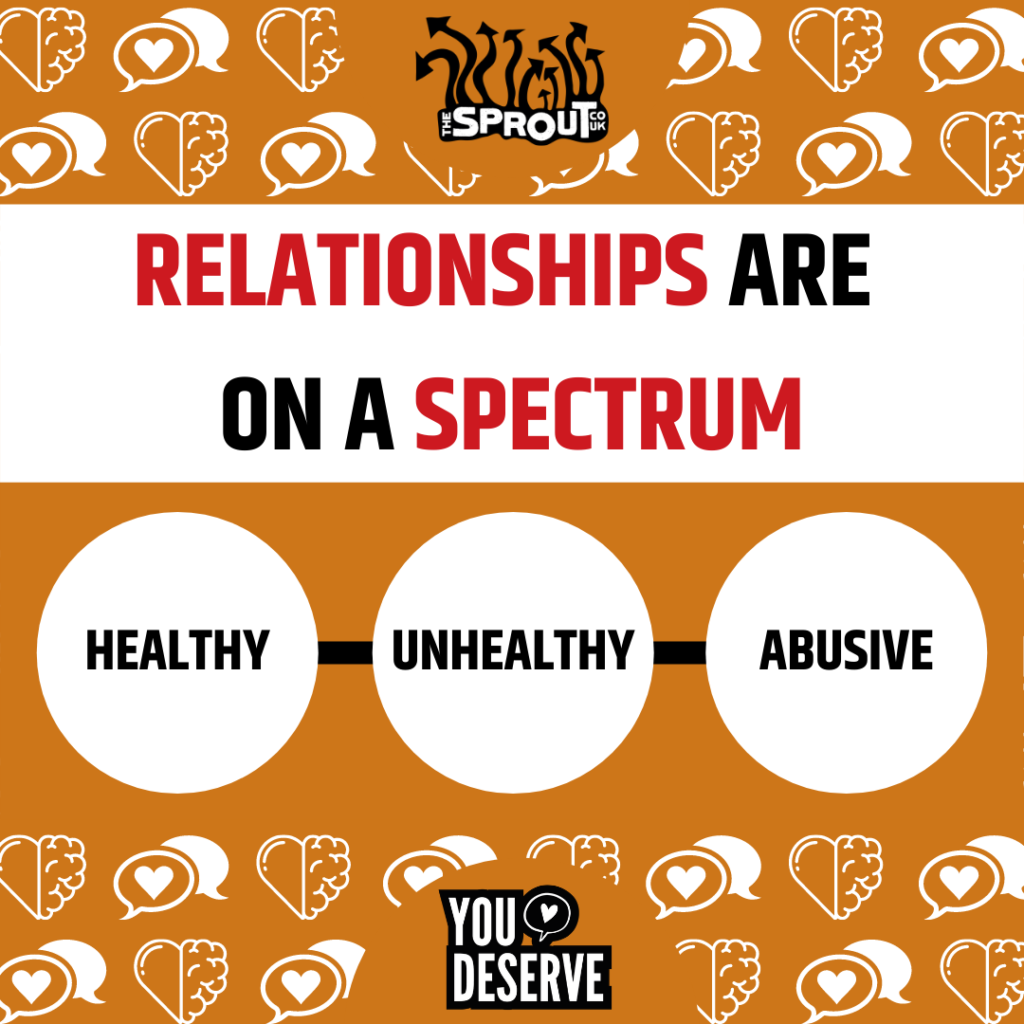Relationships aren’t static! All relationships are on a spectrum from healthy to abusive, with unhealthy relationships being somewhere in the middle.
This article was written by a young person as part of our #YouDeserve: Healthy Relationships Campaign.
To find out more about the campaign click here.
What does a healthy romantic relationship look like?
Everybody deserves to have great relationships with respect and love. Being in a positive relationship will make you and your partner feel loved, special, secure, confident and important. Achieving a strong and healthy relationship requires compromise and understanding, which can be hard work. It is important that both you and your partner want to and do make an effort. Remember, the more positive effort and energy you both put in together, the more positive the relationship will be for both of you.
Let’s take a look at some aspects of healthy relationships:
What’s the difference between healthy and unhealthy relationships?
Unhealthy relationships are common, however, the signs of a relationship being unhealthy are not always clear. If you are in a relationship and you feel worried, scared or pressured into doing things that you don’t want to, then this is not okay. Should this be the case, it may be an abusive relationship. A healthy and loving relationship is based on respect not fear.
Let’s take a look at some common factors that may help you to assess whether you are in a healthy or unhealthy relationship:
The fine line between an unhealthy and an abusive relationship
All relationships that are abusive are unhealthy, however, not all unhealthy relationships are abusive. The crossover between abusive relationships and unhealthy relationships may include some similar aspects:
- Physical abuse – Physical abuse can be characterised as hurting the outside of a body, for example, punching, slapping, pushing, and kicking.
- Emotional abuse – Emotional abuse includes actions that affect how you think or how you feel, for example, manipulation, intimidation, mocking, harassment, name-calling and gaslighting.
- Financial abuse – Financial abuse is taking control of a partners money eg. stealing from you, stopping you from earning your own money, making you pay for everything and not allowing access to personal money.
- Sexual abuse – Sexual abuse includes being forced or pressured into sex or sexual behaviour that you are not comfortable with. This is always wrong and illegal.
Abuse can be a very difficult subject for people to talk about as it can be confusing and difficult to recognise that you are being abused. Being abused in any way can make you feel frightened, alone, confused, ashamed, embarrassed, guilty and angry.
Many people who are being abused worry that they will get into trouble or that their family won’t believe them if they told them what is happening. Remember, it is not your fault if you are being abused. You are in no way responsible for what is happening. There is always a way out of the problem and people you can talk to, you don’t have to keep it to yourself.
How can I talk to someone about my relationships?
Everyone has the right not to be abused and to be offered protection from abuse and there are people who can and will help you. Deciding to tell someone and finding help is an important step to making the abuse stop. It can be a difficult thing to do especially with the way it can make you feel but it only takes a moment of bravery and courage to tell someone to help prevent you from being abused again.
If you’d like to discuss your relationships with someone, there are plenty of options. Firstly, you could choose to speak to someone that you trust like a member of the family, a close friend, a teacher, a youth worker, doctor, your school nurse or a neighbour. If you find it difficult to talk about what’s happening, you could write them a letter and talk about it after they have read it
If you’re not comfortable speaking to someone that you know, there are special organisations dedicated to helping young people who are being abused or to help people who know someone who is being abused. These organisations are there to listen and help.
Related information
This article is part of the Healthy Relationships campaign. If you would like to read more about the Healthy Relationships campaign and see more content including information, support young people’s experiences, click here.
If you want help or advice about relationships, or if there’s anything else worrying you, then you can call Meic and speak to a friendly advisor. Meic is an information and advocacy helpline open from 8am to midnight, 7 days a week, for children and young people aged in Wales.

